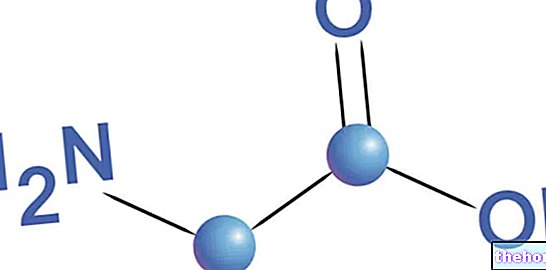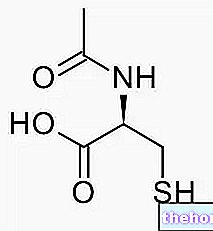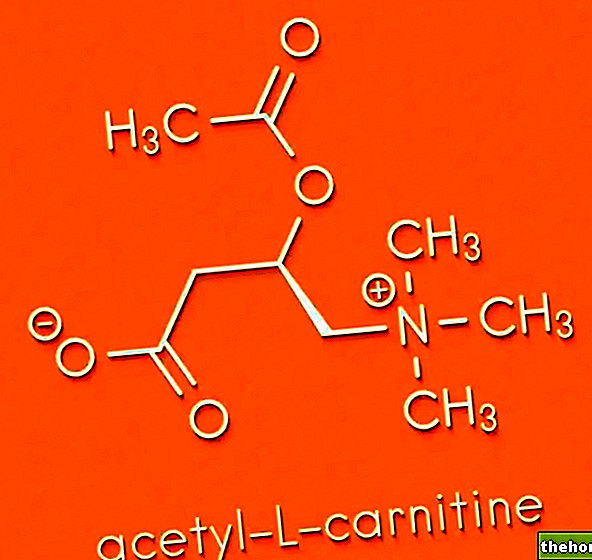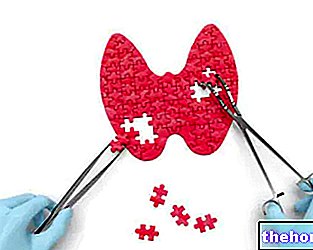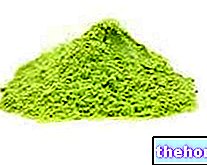Generality
N-Acetylcysteine - classically defined NAC or more simply Acetylcysteine - is the N-Acetyl derivative of the more common amino acid L-Cysteine.

Acetylcysteine - Chemical structure
Taken in the form of a supplement or as a drug therapy, N-Acetylcysteine has proved useful both in cases of acute paracetamol intoxication, and as an antioxidant, mucolytic and cytoprotector.
Among the drugs based on N-Acetylcysteine we mention the registered specialties Fluimucil, Rinofluimucil, Solmucol and Broncohexal
Indications
Why is N-Acetylcysteine used? What is it for?
N-Acetylcysteine is an important reducing agent, therefore known above all for its marked antioxidant properties.
In addition to the ability to regenerate Glutathione, one of the most important antioxidants available to the human body, N-Acetylcysteine has also proved effective as an anti-apoptotic agent.
This last activity was particularly valuable at the pancreatic level, safeguarding the number and functionality of Beta cells, and at the nervous level, preserving the vitality of the nerve cells (neurons).
Finally, the ability to reduce the disulfide bridges present in the mucoproteins has also given N-Acetylcysteine a mucolytic activity.
By virtue of these properties, N-Acetylcysteine is used today:
- As a hepatoprotective agent;
- As an antioxidant, especially in age-related diseases such as those of the central nervous system (eg senile dementia);
- As a cardioprotective element;
- As a mucolytic.
Recent evidence, mostly experimental, would also attribute to N-Acetylcysteine a useful potential against diabetic pathologies.
Properties and Effectiveness
What benefit has N-Acetylcysteine shown during the studies?
The scientific literature, at the moment, proposes several studies, mostly experimental, which enhance the preventive and therapeutic properties of N-Acetylcysteine.
Of particular note would be:
- Studies conducted on patients with chronic obstructive pulmonary disease, in which the addition of N-Acetylcysteine to conventional therapy would have reduced the exacerbation of symptoms by 41%;
- Studies conducted on experimental models, in which N-Acetylcysteine would have improved the contractile capacity of the myocardium, while reducing platelet aggregation and the risk of any thrombo-embolic complications;
- Studies conducted on athletes, in which the use of N-Acetylcysteine, in conjunction with other antioxidants, would have reduced the concentrations of markers of oxidative damage induced by intense physical exercise;
- Studies in which the prolonged use of N-Acetylcysteine would have preserved the structural and functional integrity of neurons, correcting some mnemonic deficits;
- Studies conducted on military and exposed personnel, in which the use of 900 mg of N-Acetylcysteine would have prevented the appearance of hearing disorders.
The antiapoptotic and anticancer activities of N-Acetylcysteine, described for the moment only in in vitro studies, remain somewhat discussed.
Dosage and method of use
How to use N-Acetylcysteine

In order to prevent the rare possibility of kidney stone formation, it is advisable to drink plenty of water at the same time.
Side effects
The most frequently observed adverse reactions following the use of N-Acetylcysteine are: nausea, vomiting, diarrhea, migraine and skin rash.
Only rarely and especially following the parenteral use of N-Acetylcysteine, clinically more important reactions, such as urticaria, severe allergic reactions, bronchospasm, hypotension and pruritus would have been described.
Finally, there are some indications according to which the use of N-Acetylcysteine, in predisposed patients, could increase the risk of renal lithiasis.
Contraindications
When should N-Acetylcysteine not be used?
The use of N-Acetylcysteine is contraindicated in patients with cystinuria or with known hypersensitivity to the active ingredient or to structurally related active ingredients.
Pharmacological interactions
What drugs or foods can modify the effect of N-Acetylcysteine?
At the moment there are no known interactions with drugs, food supplements, herbal products or foods capable of altering the normal biological characteristics of N-Acetylcysteine.
However, the simultaneous intake of Nitrates or Carbamazepine could alter the normal pharmacokinetic profile of these active ingredients and of N-Acetylcysteine itself, with unpredictable consequences.
Precautions for use
What do you need to know before taking N-Acetylcysteine?
The use of N-Acetylcysteine should be supervised by your doctor in the presence of gastrointestinal diseases, such as peptic ulcer, kidney stones, migraine or liver disease.
The same precautions should be taken during pregnancy and in the subsequent period of breastfeeding, phases in which the use of N-Acetylcysteine should be authorized by your gynecologist or your family doctor.
N-Acetylcysteine could also falsely positivize the keto-tests used in diabetic pathology as a metabolic marker.


